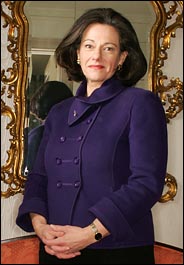So Much for Intellectual Freedom at Harvard
Posted on March 24th, 2006 in Uncategorized | 2 Comments »
Kennedy School dean David Ellwood has disassociated his school from the controversial paper written by K-School professor Stephen Walt and John Mearsheimer of the University of Chicago, the Crimson reports.
Such papers, written as part of a faculty “working paper series,” usually bear the Kennedy School logo and carry a standard disclaimer saying that they do not necessarily reflect the views of the Kennedy School or of Harvard.
But at Ellwood’s direction, the Kennedy School logo was removed from this paper, and a stronger disclaimer was inserted. It reads thusly:
“The two authors of this Working Paper are solely responsible for the views expressed in it. As academic institutions, Harvard University and the University of Chicago do not take positions on the scholarship of individual faculty, and htis article should not be interpreted or portrayed as reflecting the official position of either institution.”
Well, Dean Ellwood, why don’t you just take Professor Walt out back and shoot him?
This is not a great moment in the history of the Kennedy School. Is Walt’s paper anti-Semitic? Let’s put it this way: Reasonable people can disagree. I’ve read the paper, and I just don’t think it’s clear-cut at all. (If, for example, you replaced the word “Israel” with the words “Saudi Arabia,” I’m not sure the paper would be anti-Arab.) There may be a case that the paper’s scholarship is lackluster, but that is a different matter altogether. Professors are allowed to write bad books.
Given that this paper is clearly not the work of Louis Farrakhan, and that a credible case can be made that it is not a work of anti-Semitism, it is cowardly for the Kennedy School to hang Walt out to dry.
As Abbott Lawrence Lowell (who was, in fact, anti-Semitic) once wrote, “There is no middle ground. Either the university assumes full responsibility for permitting its professors to express certain opinions in public, or it assumes no responsibility whatever, and leaves them to be dealt with like other citizens by the public authorities according to the laws of the land.”
Ellwood is trying to carve out a middle ground hereâsaying, in effect, well, we have to let them write this stuff, but trust me, we really don’t support themâand it makes him look weak.
What’s going on here? Well, apparently it’s about money. David Gergen tells the New York Sun that he’s been reaching out to “prominent Jewish donors”âtheir words, not mineâbecause “obviously, there are some people out there who are concerned.”
Note that it isn’t, say, Jewish alums in general to whom Gergen is reaching out, but Jewish donors. This isn’t about the merits of Walt’s paper; it’s about a school with one of the smaller endowments at Harvard running scared of its donors.
The irony is that this attack on Walt and Mearsheimer only seems to bear out their paper’s suggestion that critics of American foreign policy towards Israel are hastily silenced. A Harvard professor publishes a paper criticizing the power of the “Israel lobby.” Prominent Jews such as Alan Dershowitz and Martin Peretz call the authors anti-Semitic. A pro-Israel, right-wing newspaper whips up a controversy. Jewish donors start making phone calls. The Kennedy School starts to distance itself from the professor. No longer welcome at Harvard, the professor leaves for a lesser institution…. (This last hasn’t yet happened, but I wouldn’t be surprised.)
To be fair, I don’t know what else sincere critics of this paper are supposed to do; if they really believe the paper is anti-Semitic, they should certainly say so.
But this sequence of events has the unintended consequence of making Walt and Mearsheimer look more credible and less anti-Semitic.

